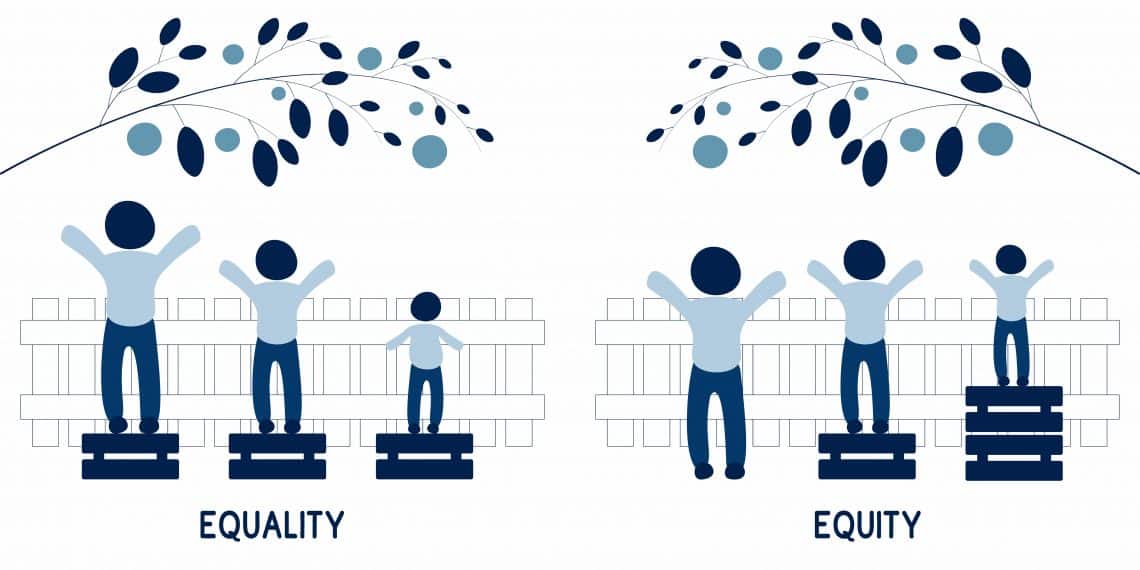Inequity and inequality, which are words you’ll hear in discussions about human rights and social justice, are often used interchangeably. Though subtle, the differences are important to know. In this article, we’ll describe what inequity and inequality are and how they can be addressed.
Inequity and inequality: the definitions
Inequity refers to a lack of equity, which means “justice” or “fairness.” Where there’s inequity in a community, it means injustice, unfairness, and bias are being perpetuated. That might sound exactly like inequality, but inequities are what cause inequality. Let’s say two people have a heart attack. One lives in a city and reaches a good hospital quickly. The other lives in a rural area where healthcare quality is poorer. Because of this inequity, there’s an unequal outcome.
Another way to think about inequity versus inequality is that inequities are avoidable. Rural areas aren’t destined to have poor healthcare. Poor quality is due to factors like budget cuts, fewer physicians, fewer preventative screenings, and more. Inequality, on the other hand, may not be completely avoidable. Even if both patients got to a good hospital quickly, they wouldn’t necessarily have an equal health outcome due to factors like their age. It might not be possible to achieve total equality in society, but dealing with inequities removes avoidable barriers.
What causes inequity?
Continuing to use health as our framework, what are the causes of inequity? In a 2017 report from The National Academies of Sciences, Engineering, and Medicine, researchers identified several main drivers: poverty, lack of public transport, exposure to violence, unemployment, low educational attainment, inadequate housing, and neighborhood deterioration. A person’s behaviors and choices also affect health, but research consistently shows that factors like physical environment, education, income, and so on predict health status.
What are the consequences of health inequity?
Health inequities lead to worse outcomes for many. Here are a handful of examples:
Unequal distribution of disease
The distribution of disease is one of the most glaring examples of health inequality in the United States. Heart disease, which includes any disease affecting the heart or the heart’s blood vessels, affects 30 million Americans. It’s the leading cause of death for both men and women. However, Black Americans are 30% more likely than white Americans to die from heart disease. Biology doesn’t explain a difference this significant. Rather, Black Americans are more likely to experience higher stress, live in food deserts, have less access to good medical care, and possess a distrust of the medical system due to past and current racism.
Higher maternal and infant mortality rates
Every year in the United States, around 700 women die due to pregnancy or complications with pregnancy. About ⅓ of deaths occur during pregnancy, over half occur during labor or the first week after, and the rest occur between six weeks and one year after labor. Because data collection and reporting aren’t the same in every state, even more women are likely dying. Black and Native women are more likely to die than white women. This isn’t inevitable. According to the report, “Racial Disparities in Maternal and Infant Health: An Overview,” most pregnancy-related deaths could be prevented. Infants born to women of color face similar challenges. Per infant mortality data from 2018, 10.8 Black infants per every 1,000 live births die, while 9.4 Native Hawaiian and other Pacific Islander infants die. That’s compared to 4.6 for white infants and 3.6 for Asian infants. The report specifies that “historic and ongoing racism and discrimination” play a role in these disparities.
Lower life expectancy
In a report by the Health Inequality Project using data from 2001-2014, researchers found that the richest Americans got three years added to their lives. The poorest Americans’ life expectancy didn’t change. That means the wealthiest American men live 15 years longer than the poorest men. The wealthiest American women live 10 years longer than the poorest women. This doesn’t mean that increasing a person’s income guarantees them a longer life – there are still other health factors – but when someone is poor, it affects things like how much education they get, what food they eat, where they live, the healthcare they can afford, and the level of stress they experience daily. These all have health implications, which have implications on life expectancy.
Less access to good mental health services
According to data from the American Psychiatric Association, Black Americans and the general population share similar rates of mental illness. However, there are stark disparities. Only ⅓ of the Black Americans who need mental health services get any. When they do get care, it tends to be lower quality. They’re less likely to be offered evidence-based medication therapy or psychotherapy. Black Americans with mental health conditions (especially bipolar disorder and schizophrenia) are also more likely to be incarcerated. There are a handful of reasons for these inequities, including a lack of good insurance and not many providers from diverse ethnic backgrounds. Distrust of providers is also present, which makes sense given how the medical system has historically harmed Black Americans.
How can society solve health inequity and inequality?
A systemic problem requires a systemic solution. A multi-pronged approach has the best chance of success. Since we’ve been focusing on the United States, here are some examples of what needs to be done:
Increased awareness among healthcare providers
Acknowledging the problem is the first step to addressing inequity and inequality. There’s been consistent research showing that discrimination drives unequal health outcomes. That discrimination often comes from the medical system itself. Racial and ethnic minorities and women are more likely to receive inaccurate diagnoses, poorer treatment, and less pain management. These experiences with the medical system – which are often traumatic – discourage people from going to the doctor and can lead to severe health consequences, including preventable deaths. Health Affairs, a leading journal on health policy research, recommends that medical providers increase their awareness of inequities. This includes bias training, hiring more interpreters and translators, employing equity officers, and actively pursuing more diverse pools of physicians and clinicians.
Investments in education
Research shows a link between educational attainment and health indicators, like life expectancy. There’s even an inter-generational link, meaning that a parent’s educational attainment affects their children’s health. As a person becomes more educated, they’re more likely to gain skills that affect health behaviors and qualify them for higher-paying jobs. As we’ve established, a person’s income has close ties to their health. The less education a person has, however, the more likely they are to struggle with health issues. Health also impacts education attainment. They reinforce each other for better or worse. If the United States wants to address health inequities, it needs to address inequities in education, as well.
Improvement of care
Even in places with enough medical providers, the quality may not be good enough. As an example, one working paper published by the National Bureau of Economic Research found that Black patients were being taken to hospitals with lower survival rates. The report analyzed 20 years of Medicare data, looking at heart attacks. By 2010, the specific hospitals impacted half of the difference in survival rates, even among Black and white patients within the same zip code. To change things long-term, the quality of these hospitals need to improve. In the meantime, the study recommended that physicians provide data on the hospitals, so patients know which ones have better records. Ambulances could also be required to take patients to better hospitals.
Establishment of universal healthcare
Universal healthcare isn’t a magic bullet to inequality, but in the United States, it would be significant. Currently, the American healthcare system is complicated. It’s a mix of federal programs (like Medicare and Medicaid) and private insurance companies. Whether or not someone is employed (and what kind of job they have) ties to insurance coverage. In 2020, about 28 million people didn’t have health insurance at any point during the year. Based on 2018 data, of the people who were insured all year, 29% were underinsured. Addressing inequities through universal health coverage, which is one of the UN’s Sustainable Development Goals, would lead to better health outcomes.
Final thoughts
Addressing inequity is the only way to achieve equality. The definitions may seem too similar to matter, but when it comes to policy, the difference is crucial. Let’s consider a policy that prioritizes “equal” over “equitable.” In the United States, the Biden administration launched a program in January 2022 where Americans could get up to four free Covid-19 tests mailed to them. This is equality – every address gets four tests. However, the program did not take into account differences like multi-generational homes or people living with roommates. It also didn’t account for the higher likelihood that those most vulnerable to COVID-19 (and most in need of tests) live in multiple-person households. The program claims that the test limit is in place to ensure “broad access,” but an equitable program (which at the time of this article’s writing was not in place) should account for differences. This would actually ensure more access and therefore more equality.
Health inequity is just one example of the inequities facing the world. There are disparities in education, housing, legal rights, political representation, income, and more. To close the gaps and achieve equality, each issue requires action.













